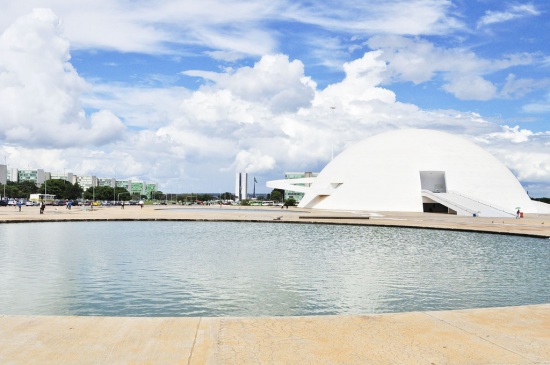Earlier this month the distinguished architect Oscar Niemeyer died aged 104. He was responsible for a number of notable buildings throughout the world but his enduring legacy will always be Brasilia, the Brazilian capital where he was able to fully express his vision of what a modern city should look like and how it might work.

Niemeyer had worked with the Swiss modernist Le Corbusier and while he never rejected the clean lines and rectilinear forms that defined the ‘international style’ he added elements of his own. Most noticeable of these are the organic curves that came to define his buildings and set them apart from those of his contemporaries.
When Niemeyer was appointed as the architect of Brasilia he had greater freedom to make his mark than anyone had enjoyed since Haussmann in nineteenth century Paris. In fact Niemeyer would have more freedom because he was building a city from scratch in the Brazilian heartland.
From the outset it was clear Brasilia was going to be unique. The city would be a symbol of progress and the architecture would reflect the aspirations of the nation. This ruled out the baroque and classical architecture of other Brazilian cities with their colonial associations and usher in the future.
From the air Luis Costa’s planned layout resembles an aeroplane. The fuselage houses the commercial heart of Brasilia and the wings its residential districts. On the ground Niemeyer’s buildings are astonishing and futuristic.
They have been described by the British architect Sir Norman Foster as ‘hauntingly beautiful’ and ‘absolutely magical.’
“There’s a wonderful optimism and beauty and light about them,” he says. “They make life richer for everybody who uses them.”
But Brasilia also has its critics who claim that the city is a utopian dream that, in reality, fails as a place to live and work. Niemeyer, a life-long communist, planned the residential districts as places where all classes of citizens would live side by side. Today only the wealthy live in these apartments. The less well-off have been priced out and now occupy satellite towns out of sight of Brasilia’s gleaming buildings.
Another issue is the question of how a city develops and how it reflects the commerce and other activities that take place on its streets. Ricky Burdett, a Professor of Urban Studies believes Brasilia has some fundamental weaknesses.
“The problem is that it’s not a city. It’s as simple as that,” he says. “The issue is not whether it’s a good city or a bad city. It’s just not a city.
“It doesn’t have the ingredients of a city: messy streets, people living above shops, and offices nearby. It’s a sort of office campus for a government.”
Journalist Lucy Jordan agrees. “It’s difficult as a pedestrian. It doesn’t always feel like it’s on a scale designed for humans,” she says.
Other criticisms focus on the zoning of the city and the gulf it creates between its residential and commercial property districts. They argue that this robs the city centre of street life and vibrancy.
But whatever its faults, there is no denying the ambition of Brasilia or the splendour of Niemeyer’s architecture. Maybe, Burdett concedes, it’s simply too early to arrive at a conclusive judgement. Brasilia is only 50 years old whereas cities we admire like London and Rome have developed over hundreds or even thousands of years. Haussmanns’s Paris was derided for its tedious monotony in the nineteenth century.
“Let’s not be unkind,” he says. “Let’s wait another 200 years and then talk about it.”
Previous Post
Summary of High Street Highs and Lows From 2012